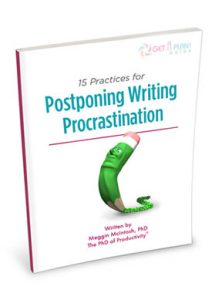Tactics for Writing Productively by Meggin McIntosh, PhD
 Tactics…sounds somewhat militaristic (and it is) – and the term can be applied to any endeavor that requires careful planning that has the intent of achieving objectives that were strategically determined. Consider viewing your writing strategically – and put the planning, attention, and effort into it that is required of writers with a serious purpose.
Tactics…sounds somewhat militaristic (and it is) – and the term can be applied to any endeavor that requires careful planning that has the intent of achieving objectives that were strategically determined. Consider viewing your writing strategically – and put the planning, attention, and effort into it that is required of writers with a serious purpose.
-
Have a goal. In most aspects of life, having a goal is at least a first step toward achieving that goal. Clarify what your writing goals are for today, this week, this month, this semester, or this year. Write those goals down somewhere (get it?… “write” them). Goals that aren’t written are only wishes (and you know the saying about ‘if wishes were horses…”).
-
If you don’t get your writing done, donate to a cause that you hate. This may seem crazy, but, as they say, ‘whatever it takes.’ The dread of the donation gets you back in front of your computer (or wherever you write) on the days you think, ‘uh, maybe not today.
-
Create your mind map or outline ahead of time and then just fill it in with additional explanation. Sometimes you are too tired to complete a massive writing project, but you could ‘brainstorm’ ideas related to one or more of your projects. Start an outline, a list, or a mind map that gives you the skeleton of your article, chapter, or other piece of writing. Having the structure already in place gives you a starting place when it comes time to write.
-
Go to your ‘third place’ where there is energy. If you check Wikipedia for the definition of ‘third place,’ you will see that it is a term that was coined by Ray Oldenberg and refers to places that are separate from home or the workplace and are ‘anchors’ of community life, which foster energy and creative interaction (e.g., Starbucks). Since writing involves various types of psychic energy expenditure, being in a place where there is energy helps you to write.
-
Have quotes that inspire you. Gina Hiatt of www.AcademicLadder.com collects wonderful writing quotes and often displays them on her site or puts them in her newsletter. Find quotes that you like and then keep a list of them in your planner, your iPhone, or on post-it® notes near those places that you write.
-
View writing as a flow of energy. Writing involves an exchange of energy because it both requires energy and inspires energy. When you employ the tactic of viewing writing as a ‘flow’ of energy, you put yourself in a mindset that is calm and easy – like a gentle flow.
-
View writing as creating. It is. And, here’s the good news. Your brain was designed for creative thinking and problem solving. How perfect that is for writers?! Be thankful.
-
Join (form) a writer’s group. Even though a recent survey, reported in Writer’s Digest (November/December 2009) indicated that 85.7% of writers prefer to write alone, there are many reasons to be in a group with other writers. You can hold one another accountable, share drafts, offer leads to each other…and the list goes on. Kerry Ann Rockquemore (http://newfacultysuccess.com) shared the idea in one of her newsletters about a ‘write-on-site’ group. Everyone just meets at a coffee shop and writes – but each person works on his/her own project. It works.
-
Get a room. One of my friends sent me this email recently: “Guess what I did this weekend? I rented a hotel room and finished my book!” If you need to rent a room – at a hotel, a conference center, or any other venue in order to have uninterrupted time (and LOTS OF SPACE) to get your writing done, then do so. What the heck?!
-
Have multiple writing projects. This is great because if you’re not in the mood for one, you might be in the mood for another one. Generally, we don’t just have one outfit to wear because there are days that call for one look and days that we’re in the mood for another. Having myriad options helps us stay fresh instead of frozen when presented with today’s writing time.
© Meggin McIntosh, PhD (also known as “The PhD of Productivity”®). One of the ways that you can learn from Meggin about productive writing is through her 30 Articles in Just 30 Days program (www.30ArticlesinJust30Days.com).
 Do you know any writers who procrastinate? Could that writer actually be you? We writers know perfectly well that we procrastinate, sometimes in very clever ways. In need of tips to help you stop? You’ll want the Get a Plan! Guide® to Postponing Writing Procrastination, part of the Get a Plan! Guides® series.
Do you know any writers who procrastinate? Could that writer actually be you? We writers know perfectly well that we procrastinate, sometimes in very clever ways. In need of tips to help you stop? You’ll want the Get a Plan! Guide® to Postponing Writing Procrastination, part of the Get a Plan! Guides® series.
Inside, you’ll find 15 practices to postpone your writing procrastination. You’ll receive the ideas and inspiration to do your work easier, faster, and in a more focused fashion.




